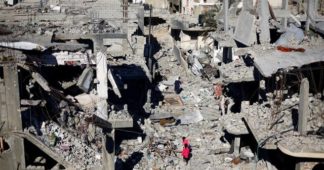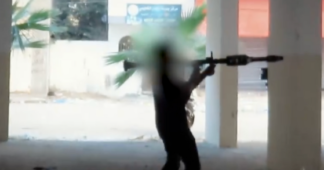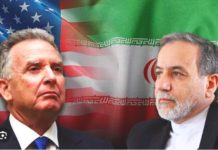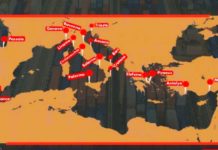Jonathan Cook*
1 May 2025
The disclosure: I was one of 20 people who contributed expert reports for a recent legal submission to the British home secretary, Yvette Cooper, calling on her to end the proscription of Hamas as a terrorist organisation.
You can read my submission – on the significant damage done to journalism by Hamas’ proscription – here.
If, as widely expected, Cooper does not approve the application, prepared by the London-based Riverway Law firm on behalf of Hamas, within the 90-day time limit, her decision will be referred to an appeal tribunal for judicial review.
The disclaimer: Nothing that follows is intended in any way to encourage you to take a more favourable view of Hamas. It is not intended in any way to encourage you to support Hamas. It does not endorse the opinions or beliefs that are supportive of Hamas, as set out in the submissions calling for the de-proscription of Hamas.
The purpose of this article is to show how the law and the establishment operate together to stifle legitimate criticism of the Israeli occupation.
If all this sounds crazy, given both that stating facts should not be illegal and that I cannot possibly know how anyone might receive and feel about any information regarding Hamas, then you are starting to understand why the application to the home secretary is so urgent and important.
Secret meetings
The UK may have declared Hamas’ armed wing a terrorist organisation a quarter of a century ago, but its political and administrative wings were added to the proscribed list much more recently – in 2021.
Which is why Cooper, the current home secretary, was misleading in the way she dismissively responded to the de-proscription application submitted to her office. She told LBC: “Hamas has long been a terrorist organisation. We maintain our view about the barbaric nature of this organisation.”
It was Priti Patel who, as home secretary, added Hamas in its entirety, including its political and administrative wings, to the proscription list shortly after she was rehabilitated and readmitted to Boris Johnson’s government in 2019.
Two years earlier, she had been forced to resign from her post as international development secretary in disgrace.
Why? Because she was found to have held 12 secret meetings with senior Israeli officials, including Israeli Prime Minister Benjamin Netanyahu, without disclosing those meetings to her colleagues and while she was supposedly on a family holiday.
It later emerged she had also secretly met other Israeli officials in New York and Westminster.
Patel’s political career has been distinguished by an evident attentiveness to Israeli concerns.
Undoubtedly her decision to proscribe Hamas’ political and administrative wings, treating them as identical to the armed section of the organisation, was high on Israel’s wish list.
It instantly degraded Britain’s political discourse so that it became all but impossible to discuss Hamas’ rule in Gaza or Israel’s blockade of the enclave in a balanced or realistic way. It resulted in a simplistic black-and-white picture of life in the enclave in which everything Hamas was bad – and therefore, by contrast, everything Israeli was good.
That would spectacularly serve Israeli interests two years later, when, following the Hamas-led attacks on 7 October 2023, Israel fed the western media entirely fabricated stories of Hamas “beheading babies” and carrying out “mass rapes”.
For months afterwards, as Israel set about murdering Palestinians in Gaza en masse and levelling their homes, the only question media interviewers directed at anyone criticising Israel’s actions was this: “Do you condemn Hamas?”
Even the ever-swelling death toll figures recorded by Gaza’s health ministry – proven to be so reliable in previous Israeli attacks that international bodies and the Israeli military itself relied on them – were suddenly treated as suspect and inflated. Independent research continues to suggest otherwise.
Western media outlets appended “Hamas-run” to the health ministry, and its casualty figures – almost certainly a massive undercount given Israel’s systematic destruction of the health sector – were now reported only as a “claim”.
In turn, these deceptions were implicitly used to justify Israel’s own, far greater atrocities in killing and maiming hundreds of thousands of Palestinians, most of them women and children, destroying the enclave’s hospitals and supporting infrastructure, while at the same time starving the entire population.
Eighteen months on, “evil Hamas” is still the story, not Israel’s all-too-obvious genocide.
Bullied into silence
Concerns about Hamas being proscribed in its entirety – not just its armed wing – are far from hypothetical, given the expansive wording of the UK’s Terrorism Act since 2019, when it was amended.
In particular, a revision to Section 12 means that anyone who “expresses an opinion or belief that is supportive of a proscribed organisation”, and one that might “encourage support” for that organisation, is liable to arrest by terrorism police, prosecution, and up to 14 years in jail.
For expressing an opinion.
The wording is so vague that, for example, simply criticising Israel for committing greater and more numerous atrocities than Hamas could theoretically have the counter-terrorism police banging on your door.
To avoid prosecution, Riverway Law’s website dedicated to its application to the home secretary carries a legal disclaimer: “By entering this website you acknowledge that none of the contents can be understood as supporting, or expressing support for, proscribed terrorist organisations under the Terrorism Act 2000.”
The British government is not a neutral party in the levelling of Gaza, the decimation of its people by bombs, the ethnic cleansing of swaths of the enclave, or the starvation of the population
Several independent British journalists and commentators – those whose careers are not dictated, and protected, by billionaires or the UK state broadcaster – have had their homes raided at dawn by counter-terrorism police or been arrested at the border as they return home.
One political commentator, Tony Greenstein – who also happens to be Jewish and a trained lawyer – is currently being prosecuted under Section 12 of the Terrorism Act. Others are under prolonged investigation. They have the threat of prosecution hanging over their heads like a sword.
The rest of us are meant to take note, feeling the chilling effect. Do we want the police breaking down the door of our homes at dawn? Do we want to be arrested on return from holiday, our partners and children looking on in horror?
The National Union of Journalists has called the police actions against journalists “abuse and mis-use of counter-terror legislation” and warned that they risk “threatening the safety of journalists”, as well as their sources.
Understandably, you may be barely aware of these repressive police tactics, which have been accelerating since Keir Starmer came to power. He, let us recall, personally approved, as opposition leader, Israel’s crime against humanity of blocking food, water and power to Gaza.
The BBC and the rest of the media have failed to meaningfully report these incidents – which are characteristic elsewhere of police states.
Is that because these media outlets are themselves cowed into submission by the Terrorism Act?
Or is it because they are simply mouthpieces of the same British establishment that made it illegal to express support for objectives which are the same as those sought by Hamas’ political, as opposed to military, objectives?
Let us remember – and it’s easy to forget, given how rarely such things are mentioned by the British media – that the same UK state that proscribed Hamas continues to arm Israel directly, helps ship weapons from other countries to Israel, supplies Israel with intelligence from British spy planes over Gaza, and provides Israel with diplomatic cover – all while Israel carries out what the International Court of Justice (ICJ) calls a “plausible genocide”, and while its sister International Criminal Court (ICC) seeks the arrest of Netanyahu for crimes against humanity.
The British government is not a neutral party in the levelling of Gaza, the decimation of its people by bombs, the ethnic cleansing of swaths of the enclave, or the starvation of the population. It is actively assisting Israel in its genocidal campaign.
The UK establishment is also, through its proscription of Hamas and the wording of the Terrorism Act, bullying journalists, academics, politicians, lawyers – in fact, anyone – into silence about the context of its complicity, into an unwillingness to scrutinise its rationalisations for collusion in genocide.
‘No civilians’
There are two main objectives behind Riverway Law’s submission to the home secretary against Hamas’ proscription as a violation of the European Convention on Human Rights.
The first concerns the proscription of the entire organisation by the British government. This is the part of the legal submission that has attracted most attention – and which has been used to vilify the lawyers involved
As barrister Franck Magennis has explained, Riverway’s hands were tied because Patel – now the shadow foreign secretary – added Hamas to the list as a single entity in 2021, making no distinction between its different wings. That meant the lawyers had no choice but to petition for the entire group to be deproscribed.
The government set the terms of the legal debate, not Hamas or its legal representatives.
Hamas’ lawyers accept that its military wing meets the definition of a terrorist organisation under the terms of the UK’s Terrorism Act. They argue this law casts the net so wide that any organisation using violence to achieve political ends is covered, including the Israeli, Ukrainian and British militaries.
The establishment media have tried to smear Riverway and its barristers as Hamas “stooges” and supporters of terrorism – amply illustrating why the case is so necessary.
An openly hostile interviewer for LBC appeared to think he had caught out Magennis in some kind of ethical or professional lapse because he chose to represent Hamas without payment – as he must do under UK law because Hamas is a proscribed organisation.
The implication was that Magennis was so enthusiastically supportive of terrorism that he was willing to take on time-consuming and career-damaging work for free – rather than that he is doing so because there are vitally important legal and ethical principles at stake.
Not least, the proscription of Hamas’ political wing, including its governmental and administrative institutions, treats them as extensions of the armed struggle.
It breathes life into Israel’s patently ridiculous claims that all of Gaza’s 36 hospitals are really “Hamas command and control centres”, that Gaza’s doctors can be killed or arrested and taken to torture camps because they are “Hamas operatives” in disguise, and that Gaza’s paramedics can be executed because their rescue missions supposedly aid Hamas.
And worse, ultimately proscription supports Israeli leaders’ genocidal statements that there are “no civilians in Gaza”, a place where half the population are children.
Bargaining chips
The proscription of Hamas in its entirety ignores the fact that the group has political goals – ones Gaza’s population voted for 19 years ago to liberate themselves from decades of Israel’s brutal and illegal military occupation. Those goals are distinct from Hamas, yet expressing support for the objectives gives rise to the risk of being investigated by the police and prosecuted by the the Crown Prosecution Service (CPS).
Gaza’s people – the less than half who were old enough to vote two decades ago – were driven down the path of supporting armed resistance in the pursuit of national liberation for an all-too-obvious reason. Because Israel had refused to make any concessions to Hamas’ political rivals, headed by Mahmoud Abbas in the West Bank.
Abbas, head of the Palestinian Authority, has been using strictly diplomatic means – which Israel also opposes – to achieve statehood.
It reverses reality, treating all those Israelis held in Gaza as ‘hostages’ who have been ‘kidnapped’, even those who are soldiers, while approving of Israel’s actual kidnapping of Palestinians
The proscription of Hamas sweeps out of view the fact that a people under occupation have a right enshrined in international law to use armed struggle against their military oppressors. It makes it perilously dangerous to show support for the armed struggle of Gaza’s Palestinians lest you are accused of breaching Section 12 of the Terrorism Act 2000.
It reverses reality, treating all those Israelis held in Gaza as hostages who have been kidnapped, even those who are soldiers, while approving of Israel’s kidnapping of Palestinians in Gaza, from medical staff to children.
The latter are supposedly “arrested”. They are referred to by the western media as “prisoners”, even though most have not been charged or put on trial, and the main purpose of their detention seems to be as bargaining chips in an exchange for Israelis captive in Gaza.
And finally, since 2021, Britain’s proscription of Hamas’ political wing has effectively meant the UK has given its backing both to Israel’s refusal to talk to Gaza’s government, and to Israel’s near two-decade-old siege of Gaza that turned it into little more than a concentration camp holding 2.3 million Palestinians, further radicalising the population.
British politicians should understand quite how self-defeating such an approach is. After all, it was only through talking to Sinn Fein, the political wing of the “terrorist” IRA group, that Britain was able to negotiate a peace deal, the Good Friday Agreement, in Northern Ireland in 1998.
Attack on lawyers
Robert Jenrick, Britain’s shadow justice secretary, has called for Riverway Law and its barristers to be investigated and struck off for representing Hamas – apparently forgetting the foundational principle in law that everyone, even serial killers, have a right to legal representation if the law is not to become a hollow charade.
The Terrorism Act includes provision for an appeal by proscribed organisations against their inclusion on the list. How are they to go through the legal procedure to appeal their listing apart from through lawyers?
Disgracefully, Starmer’s officials have once again kept their silence as Hamas’ legal representatives in the UK have been turned into targets for establishment abuse. The government is as complicit in the assault at home on basic democratic rights, such as free speech and the rule of law, as it has been complicit abroad in Israel’s genocide in Gaza.
How would the Starmer government have reacted had the two British barristers who defended Israel against South Africa’s case against genocide at the ICJ last year been publicly maligned for doing so? Would it have been okay to tar those lawyers with the crimes against humanity committed by their client?
Fahad Ansari, director of Riverway Law, wrote last month to the government, urging it to speak up in defence of this team’s right to challenge Hamas’ proscription, and warning that Jenrick’s “comments are not only reckless and libellous but amount to incitement against our staff members”.
He reminded the justice secretary, Shabana Mahmood, of the previous murder of lawyers for taking on cases that challenged the British establishment, including Pat Finucane, who was killed by Ulster loyalists in collusion with the British security services, after he won several human rights cases against the British government.
Hamas’ submission makes the case that Patel provided several false grounds to justify the proscription of Hamas in its entirety.
Hamas disputes Patel’s characterisation of it as a terrorist organisation. It notes that international law allows people illegally occupied and oppressed to resist through military means.
Hamas’ former political bureau chief Mousa Abu Marzouk notes in his witness statement on behalf of Hamas that Hamas’ operation on 7 October 2023 was intended only to strike military targets, and that atrocities carried out by its fighters that day against civilians had not been authorised by the leadership and are not condoned.
It is impossible to know whether that claim is true.
It is also incredibly hard to draw attention to factors which could be said to support Abu Marzouk’s argument without also being alleged to have invited support for Hamas or as expressing an opinion or belief that is supportive of Hamas – which would risk being accused of a criminal offence under Section 12.
For example, an unknown number of the atrocities blamed on Hamas were actually caused by Israel’s green-lighting of its Hannibal directive, which authorised the Israeli military to kill its own soldiers and citizens to prevent them being seized. That included firing missiles into kibbutz homes and on vehicles heading towards Gaza, leaving only charred remains of the occupants.
The proscription of Hamas makes it very dangerous to draw attention to the sickening acts of the Israeli government despite it being entirely possible to want to call out such rank acts, irrespective of having any view about Hamas.
Also worth noting is that Hamas makes clear in its submission that, unlike Israel, it is ready to have its actions that day investigated by international bodies and any of its fighters who committed atrocities put on trial.
“We remain, as always, prepared to cooperate with any international investigations and inquiries into the operation, even if ‘Israel’ refuses to do so,” abu Marzouk writes.
He calls on “the ICC Prosecutor and his team to immediately and urgently come to occupied Palestine to look into the crimes and violations committed there, rather than merely observing the situation remotely or being subject to the Israeli restrictions.”
Israel should submit itself to investigation and, where appropriate, let its soldiers face justice. But, following the proscription of Hamas, it becomes treacherous to express that view and simultaneously note that Hamas has shown a willingness to do those actions that Israel refuses to.
Public demonised
Continue reading at www.middleeasteye.net
*Jonathan Cook is the author of three books on the Israeli-Palestinian conflict, and a winner of the Martha Gellhorn Special Prize for Journalism
We remind our readers that publication of articles on our site does not mean that we agree with what is written. Our policy is to publish anything which we consider of interest, so as to assist our readers in forming their opinions. Sometimes we even publish articles with which we totally disagree, since we believe it is important for our readers to be informed on as wide a spectrum of views as possible.











